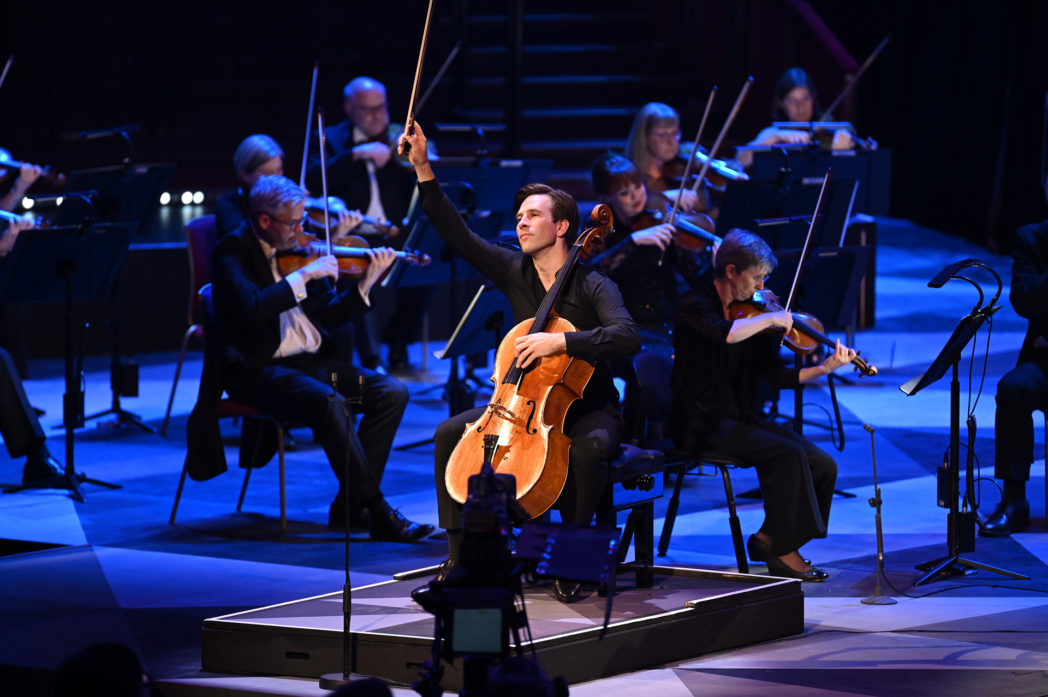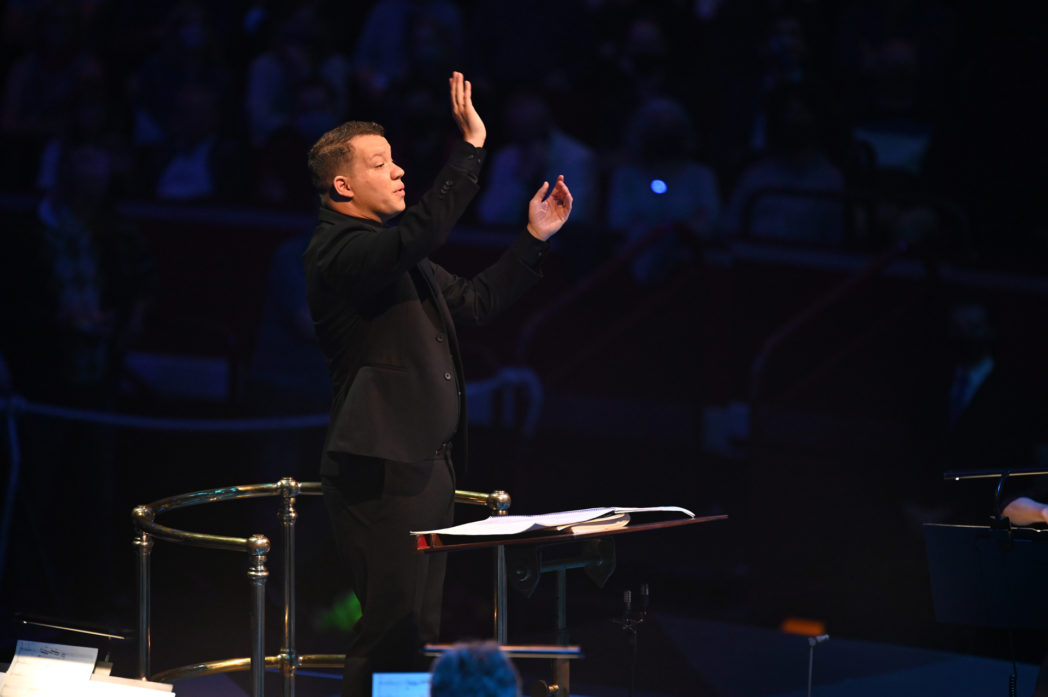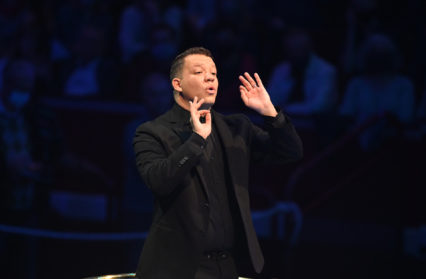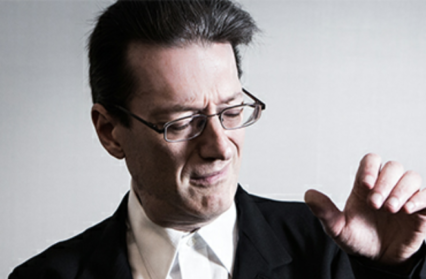David Truslove found much to admire in a confident debut from Ryan Bancroft, with the BBC National Orchestra of Wales, at the Royal Albert Hall as part of this year’s BBC Proms.
Making its first appearance at this year’s promenade concerts, with a focus on musical reworkings, reinventions and borrowings, a socially distanced BBC National Orchestra of Wales was directed by its new Chief Conductor Ryan Bancroft, replacing an indisposed Elin Chan. A winner of the 2018 Nikolai Malko Conducting Competition, Bancroft took up his appointment in Cardiff the following year. His (batonless) debut at the Royal Albert Hall made clear the direction and manner we can expect from him in the future.

The evening began with Leopold Stokowski’s 1949 exquisite arrangement of Henry Purcell’s ‘When I am laid in earth’ (Dido and Aeneas) – a four-minute curtain raiser of beguiling intimacy revealing both the warmth and delicacy of BBC NOW’s string section and the refined musicianship of principal cellist Alice Neary.
Purcell’s unruffled equanimity formed a neat starting point for the world premiere of Elizabeth Ogonek’s Cloudline – a BBC co-commission with Los Angeles Philharmonic. Like the Purcell, this new work makes use of a Chaconne, subtly plaited into its repeated chord progressions. Described by Ogonek (born Minnesota 1989) as a ‘lyrical hurricane of a piece’, Cloudline is scored for large orchestra and draws inspiration variously from Walt Whitman, Georgia O’Keeffe and BBC’s Killing Eve, as well as Stokowski’s arrangement of the aforementioned ‘Lament’. Cloudline provides no evidence of any violence associated with the cult television series, instead this work (faintly reminiscent of something by Charles Ives and John Adams) unfolds from initial woodwind murmurings, shimmering strings and swirls of brass to reveal a wealth of ear-catching detail including multi-phonics emerging from upright piano and marimba. An absorbing work of myriad colours, it closed in the same nebulous manner as it began, mystery and striking invention gathered in its single movement arch-like design.
The scintillation and Gallic charm of Saint-Saëns’s Cello Concerto No. 1 in A minor formed a marvellous counterweight to the American work. Acclaimed during his lifetime as the French Mozart, Saint-Saëns enjoyed an extraordinarily long and productive career spanning the period between Schumann’s Carnival and Stravinsky’s ballet score Pulcinella. Yet, regardless of obvious musical exceptions, this prodigiously gifted composer is still much undervalued and neglected. Technical facility has not conferred on him the status he deserves.
This performance might, for some, readdress the deficit in a work wonderfully showcasing the solo instrument’s lyrical and dramatic character. Guy Johnston (replacing the Argentine cellist Sol Gabetta because of ‘scheduling issues’) was the beguiling and velvet- toned soloist in an account all about polished restraint, with no small hint of urgency at the start, although not exactly presented here as a headlong assault. Incapable of producing an ugly tone, Johnston’s articulation was second to none, winning me over in the central Allegretto con moto (with its shades of courtly French baroque ballet style), where his richly expressive cello was in perfect accord with the BBC NOW’s muted strings. Indeed, Ryan Bancroft and the Welsh players were attentive collaborators throughout this scrupulously prepared account. In the closing section (initiated by Steven Hudson’s eloquent oboe), Johnston brought panache to virtuoso passagework and nobility of expression to its long-breathed melodic lines.

There followed a sure-footed and grittily direct account of Brahms’s Symphony No. 4 in E minor, Ryan Bancroft drawing svelte playing from his strings in the opening bars – playing here relaxed yet stylish. Opulence also characterised their playing in the second subject, and any problems I encountered with balance owing to the reduced string numbers (11/9/8/6/4) seemed to be ironed out by the radio engineers. Overall, there was a leanness of execution, the first movement’s musical logic unfolding with transparent ease, timpani to the fore in the climatic final furlong. Nothing laboured or stolid in this performance, or one that might bring to mind Eduard Hanslick’s comment after hearing the opening movement: ‘I feel I’ve just been beaten up by two terribly intelligent people’.
Horns and woodwind launched a forthright slow movement, one not without stateliness, but lacking in emotional involvement and strings now demonstrably underpowered. The Allegro giocoso was an exuberant affair, sounding pugnacious in the venue and considerably more exciting there than on the radio. Why do the engineers interfere so much? This was a coiled spring of a performance, its giocoso element driven rather than playful. Much of this last quality informed the variation form finale. Notwithstanding some overbearing brass, it was a rhythmically trenchant and momentum-filled account, its intensity of expression evidently appreciated by the attentive audience.
David Truslove casts a critical eye over a Llŷr Williams recital, as he chooses two works by Franz Schubert for a specially recorded Wigmore Hall performance.
David Truslove is a critic and regular contributor to Wales Arts Review.
Header Photo Credit: BBC/Chris Christodoulou












